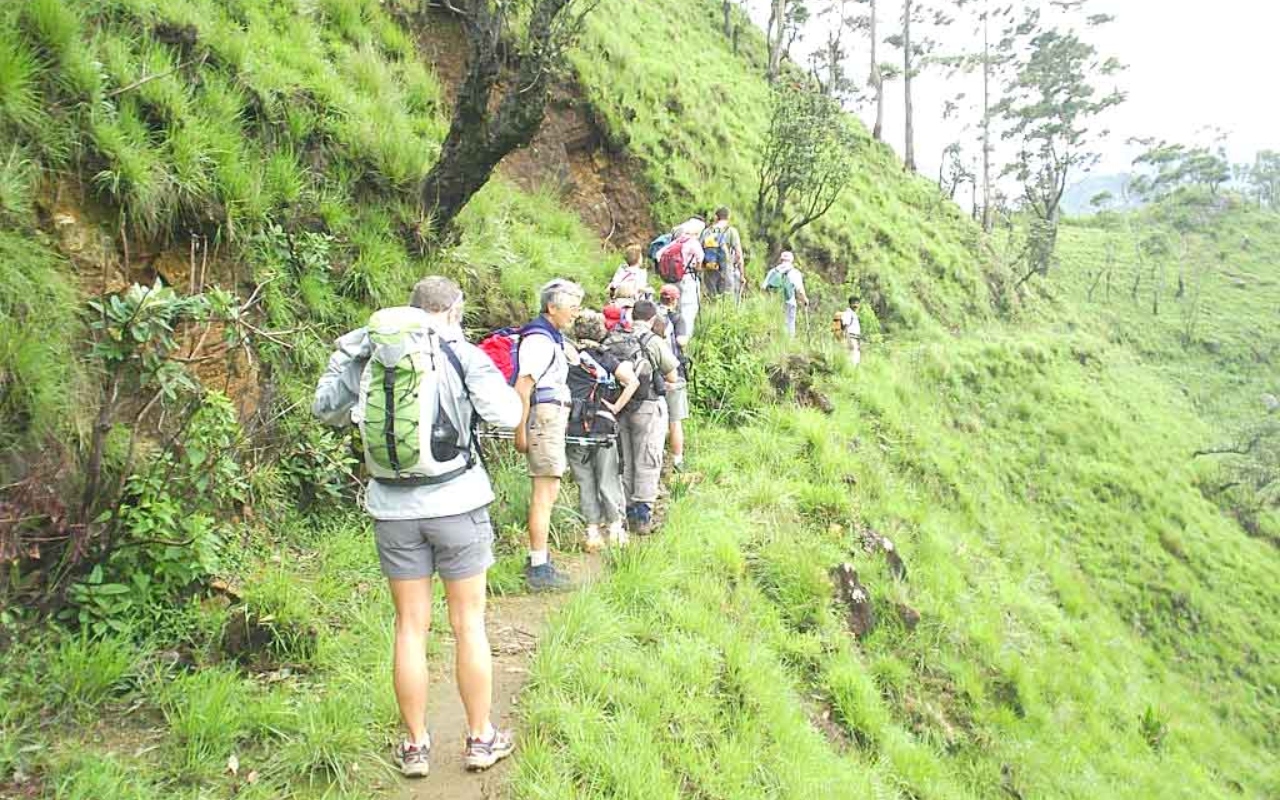TIME Magazine reveals a list of 100 extraordinary places to stay and visit every year. This year, we are thrilled to have Pekoe Trail in Sri Lanka on the list of the world’s greatest places to visit. Up in the Central Highlands, this 186-mile mountainous walking trail links the British-built 19th-century transport network with the high-grade black tea Sri Lanka is famous for. Want to know why it is worthy of its recognition?
Sri Lanka’s First Long-Distance Hiking Trail
Winding its way through Sri Lanka’s lush highlands, across vast tea plantations, colonial estates, sleepy villages, hidden footpaths, holy shrines and biodiversity-rich forests, it unfurls the story of tea and the beauty of the Tea Country. Most tea estates in the region date back to the colonial era, when tea growing began on the island. The region’s deep greenery, misty slopes and cool climes are said to have evoked the memories of old Blighty in the British Colonisers, who fell in love with it.
The route starts in Kandy, at the picturesque Hanthana Mountain Range and extends into Nuwara Eliya, the deepest of the Central Hills. Walking the entire trail takes weeks, each stage requiring approximately 6 hours. But worry not! You will find some of the most charming accommodations for every taste on your way, from colonial manor houses to Relais & Châteaux resorts. The trail is open all through the year. The hike is at a low elevation and is relatively easy. You also have the option to stay in a hotel near the trail and go out on exploratory day hikes within a single stage instead of completing it in its entirety. A dedicated app provides essential information, including nearby landmarks, segment details and emergency contacts.
Sustainable Tourism and Community Empowerment
Pekoe Trail was developed by Sri Lanka-based sustainability consultant Miguel Cunat, with funding from the European Union and the U.S. Agency for International Development after nearly 10 years of research and exploration. The aim is to put Sri Lanka on the map of world-class hiking.
This initiative emphasises eco-friendly, low-impact tourism that protects biodiversity and preserves natural habitats. The trail supports local economies, ensuring that tourism benefits communities directly while safeguarding the environment. It creates opportunities for guide training, small business development and equitable partnerships.
The experiences are safe, authentic and immersive, inspiring responsible tourism, cultural appreciation and environmental conservation among travellers. Visitors, tour operators and stakeholders are encouraged to uphold the integrity of the trail by engaging respectfully with local communities and supporting ethical tourism.
Breathtaking Beauty
The Pekoe Trail cuts through some of the most stunning and diverse landscapes in the island’s Hill Country. From sprawling tea plantations to misty mountains and cloud forests, the trail offers an ever-changing backdrop of diverse scenery. The smell of lofty eucalyptus trees and pine groves changes the scenery like picture postcards. And the cascading waterfalls scattered across the landscape make you stop and stare. The elevated terrain, ascending over 2000 metres, offers staggering viewpoints of deep valleys and distant peaks. Sri Pada, or the Adam’s Peak, is the one to look out for, the island’s most sacred summit. The wilderness is a habitat for numerous species of animals, the most frequently sighted being birds, deer and monkeys. Remote forested sections have elephants and leopards roaming.
Colonial Influence and Rich Cultural Tradition
Developed by the British in the 19th century as a hill station, Nuwara Eliya is lovingly monikered Little England. Tudor-style cottages, red-brick bungalows, grand country homes, English-style clubs, golf courses and rose gardens blend beautifully into its cool, misty climate. Scottish architecture also takes centre stage due to the Scottish heritage of many of the planters. Stone churches and Gothic Revival-style churches also adorn the landscape. Among the most notable buildings are the Nuwara Eliya Post Office, Queen’s Cottage, General’s House, The Hill Club, the Grand Hotel, Adisham Bungalow, Holy Trinity Church and Christ Church Warleigh.
The Indian-Tamil population is the backbone of the tea industry in Sri Lanka. Interwoven with the landscape is their culture, featuring colourful Hindu temples and mystical shrines throughout the area. However, the culture goes deeper into the history books, tracing millennia-old connection to the great Indian epic, Ramayana. Strewn around the Highlands are several notable places linked to the story, including temples, waterfalls, caves and gardens.
Take the Pekoe Trail with Blue Lanka Tours
The Pekoe Trail is more than just a hiking route – it’s a journey through Sri Lanka’s Tea Country, showcasing history, nature and culture, deserving of global recognition. However, its most beautiful aspect is the sustainability at its heart. If you love travel but want to travel responsibly, Pekoe Trail gets a nod from us. Blue Lanka Tours designs meaningful travel with a purpose responsibly. Committed to sustainability, we support local communities, wildlife conservation and animal welfare. Our itineraries reflect our ethos, delivering authentic experiences, cultural exchange and environmental stewardship. Just as much as we love travel, we love the natural environments and people that are part of it. Discover Pekoe Trail with us. Book your eco-conscious, responsible Sri Lankan travel today!

